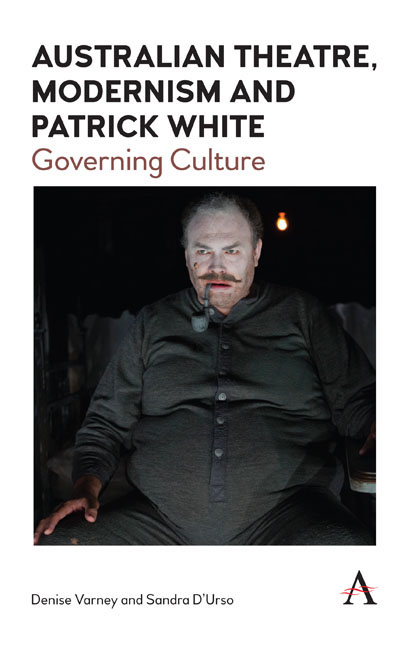Book contents
- Frontmatter
- Contents
- List of Illustrations
- Acknowledgements
- Introduction
- 1 The Archive, Governance and Sovereignty
- 2 ‘Words Fail Me’: The Ham Funeral and the 1962 Adelaide Festival
- 3 Night on Bald Mountain and the 1964 Adelaide Festival
- 4 The ‘Clowns’ Who ‘Cling to the Past’: A Sovereign Decision and the Practice of Exclusion
- 5 The Sovereignty of the Plays and Opportunities for New Publics
- Index
3 - Night on Bald Mountain and the 1964 Adelaide Festival
Published online by Cambridge University Press: 29 May 2019
- Frontmatter
- Contents
- List of Illustrations
- Acknowledgements
- Introduction
- 1 The Archive, Governance and Sovereignty
- 2 ‘Words Fail Me’: The Ham Funeral and the 1962 Adelaide Festival
- 3 Night on Bald Mountain and the 1964 Adelaide Festival
- 4 The ‘Clowns’ Who ‘Cling to the Past’: A Sovereign Decision and the Practice of Exclusion
- 5 The Sovereignty of the Plays and Opportunities for New Publics
- Index
Summary
Parsing the documents in the archive gives us a sense that the rejection of Night on Bald Mountain took place slowly and with odd turns. The story quietly assumed its shape in late September 1962, with Harry Medlin's enthusiasm for Patrick White's playwriting style – ‘the play is excellent’, he wrote. As Chair of the University of Adelaide's Theatre Guild (1961– 66), and as a member of the Festival's Drama Advisory Committee, he had already mounted an impressive defence of Australian content in the Festival of Arts and was a significant agitator for modernist theatrical aesthetics more generally. As an advocate of The Ham Funeral a year earlier, such was his belief in the strength of White's modernist plays that he noted, ‘The quaint Australian custom of always looking elsewhere can safely be abandoned.’ On 26 April 1963, the Governors delivered their fateful words. Of course, the narrative and embodied history is not as neat as all that.
We build upon a familiar argument – that is, where feelings of disgust help to fuel strict censorship practices across the arts in Australia. Feelings of disgust for White, shown by the Governors, is made palpable in the historical record. However, we take this analysis one step further by looking at the ways in which disgust was instrumentalized as an act of sovereignty, how it was tidied up, rationalized and mobilized as what was now a tried and tested procedure. The case of Night on Bald Mountain reaffirmed the sovereignty of the Board of Governors. Seeing itself as a sovereign power, it thought it was under no pressure to be popular in the media or to be considered cultured by members of the Drama Committee. However, when the news hit the media, the Board's arrogance and sense of immunity was shown to be misplaced. Its power lay elsewhere – namely, in the authority to enact an executive decision, and to do so repeatedly. Through repetition, the Board created the conditions for its own institutionalization as a power among the various committees and organizations related to the Festival. It became the end point for a ‘final decision’ to be made on matters of culture.
- Type
- Chapter
- Information
- Australian Theatre, Modernism and Patrick WhiteGoverning Culture, pp. 59 - 84Publisher: Anthem PressPrint publication year: 2018



